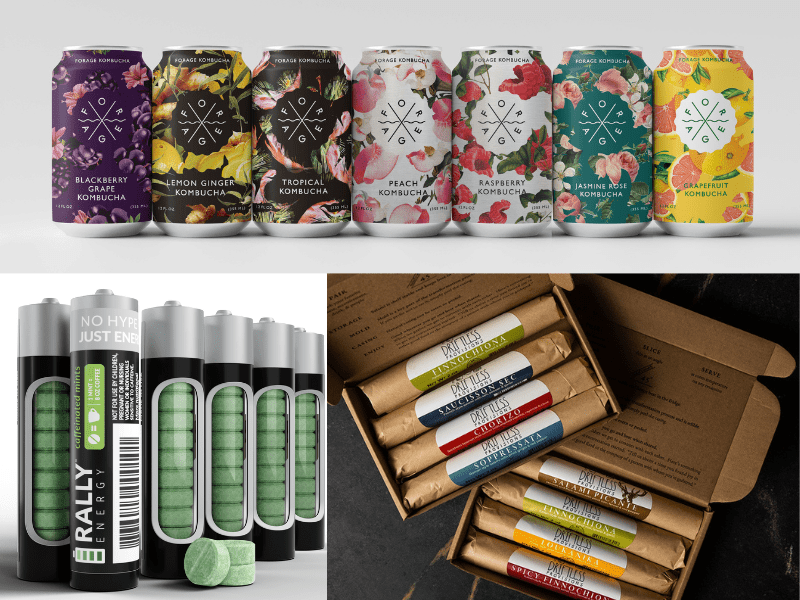Today, there are 12.3 million women-owned businesses in the U.S., compared to about 400,000 in 1972. That’s major progress, as female entrepreneurs are proving over and over again that they are just as capable as men, if not more, at starting, scaling, and succeeding with their own ventures. This is especially apparent in the food and beverage world, with women launching some of the most innovative, iconic brands in the nation.
And yet despite female founders’ proven track record, they still encounter many challenges that their male counterparts do not. Perhaps most notably, women have a harder time securing investment in their companies. In 2019, venture-capital investment in all-female founding teams hit a record high of $3.3 billion. That’s great news, for sure, but that $3.3 billion accounted for only 2.8% of all capital invested across startups in the U.S. Even though that’s an increase from 2.2% in 2018, it’s clear that we have a long way to go to make venture capital investments more equal.
Part of the problem is that, despite recent pushes toward diversity and inclusion, venture capital is still an old boys’ club. According to Axios, less than 10% of the decision-makers at venture capital firms in the U.S. are women. But even outside of the VC world, other types of investment firms and organizations also lack women in top roles. Corporate boards in the U.S. remain male-dominated too.
However, as Tera and Rachael Young, founder of beverage brand YAYAYA, discuss in the latest Edible-Alpha® podcast, the lack of diversity at the top isn’t just because men aren’t allowing women a seat at the investors’ table. Many women who could be stepping up to fund not just female food entrepreneurs but any food businesses haven’t traditionally done so.
But enough about the problem. Let’s talk about solutions. For one thing, while change may be slow, it is happening. As Rachael tells Tera, she’s started to see a shift in more men recognizing and acknowledging that female founders indeed face greater challenges securing capital—and wanting to take an active role in changing that.
But regardless of the investment climate that female entrepreneurs enter into, they can do a lot on their own accord to increase their likelihood of securing capital. Knowing the hurdles they’re up against, women may have to work even harder to become even better prepared to ask for money than the average male founder does. Gaining financial literacy is not easy—it takes time and effort—but it’s imperative.
When an entrepreneur, no matter what gender, knows their numbers, their strategy and how much money they’ll need to accomplish their goals—and can present this information with confidence—they stand a much better chance of landing the financing they desire. Sometimes, because of long-held gender expectations, women need to give themselves permission to have that confidence in money-related matters, to drive the bus on business strategy, and to steer the course of conversations.
Fortunately, today, there are resources to help female food entrepreneurs gain financial literacy and get to a place where they are truly ready to tackle the tricky investment landscape. This is a big reason why Tera founded FFI, and we’re always here to assist new food and farm business owners of any gender get on a winning path.
And now, our roundup of the best food and beverage finance news, events, and resources from around the web…  Business Model Insights
Business Model Insights
- The Founder’s Field Guide for Navigating This Crisis — Advice from Recession-Era Leaders, Investors and CEOs Currently at the Helm (First Round Review) “Today, we’re decidedly not operating in the best of conditions. With a future that’s more cloudy than clear, the dynamics founders face are magnified many times over and playing out simultaneously—at warp speed. Whatever tactics and strategies were working in January 2020, chances are they’re not as effective now.”
- Remember to build a business you can live with (The Intertwine Group)
- 8 Ways Your Old School Can Energize Your New Venture (Startup Professionals Musings)
 Raising Capital
Raising Capital
- Alternative ways to access business funds during COVID-19 recovery—and beyond (New Hope Network) Federal assistance is in high demand, but these out-of-the-box solutions are often quicker, easier, and more advantageous for smaller businesses, particularly in the natural products space.
- CFO Simplified shares tips for a crisis management plan to ride out COVID-19 (FoodNavigator-USA)
- Getting VC Attention? Why You Should Ignore It For Now And Why You Should Meet Them On Your Terms (Forbes)
 CPG/National Brands
CPG/National Brands
- Brands build buzz with virtual experiences (New Hope Network) Virtual cooking demonstrations—most posted on social media or online conferencing platforms—have emerged as a versatile tool for brands to interact with consumers cooking more meals at home. They are also very relevant given that people have been unable or unwilling to browse supermarket shelves for new products and ideas, indulge in in-store demos, or dine out.
- How coronavirus has impacted ingredient sourcing (Food Dive)
- FDA Allowing Ingredient Substitutions During COVID-19 (Food Processing)
 Market Trends
Market Trends
- Acosta: Consumers mixed on when grocery shopping will return to post-pandemic normalcy (FoodNavigator-USA) While many states emerge from several weeks of shelter-in-place mandates and businesses begin to reopen, many consumers feel their usual shopping behaviors won’t return to “normal” for some time, an Acosta report revealed.
- Coronavirus is boosting sales for center store products. Will the renewed interest last? (Food Dive)
- S. online grocery sales up again in May (Supermarket News)
 Farming and AgTech
Farming and AgTech
- Future forward trends: What’s beyond organic? (SmartBrief) “The rumblings of progressive, sustainability-minded, organic consumers (which include ideas that center on biodynamic farming and regenerative agriculture) are also being met from the industry side with a push toward disruptive agriculture and explorations of becoming “carbon positive”—all in an effort to combat growing recognition of the effects of conventional agricultural practices on climate change, water resources, and biodiversity.”
- Nearly a third of small, independent farmers are facing bankruptcy by the end of 2020, new survey says (The Counter)
- We Are All in This Together: Supporting Communities and Farmers Through a Crisis (Food Tank)
 Deals/M&A
Deals/M&A
- Southern States Coop Partners with Heliae Agriculture (AgWired) Southern States Cooperative is partnering with Heliae Agriculture to bring regenerative agriculture practices that improve yields while enhancing soil health to their farmer owners.
- Marfrig and ADM create venture to sell plant-based products (Food Dive)
- Dean, DFA Sued Over Bankruptcy Assets Sale (Food Processing)
COVID-19-Related Resources for Food and Ag Businesses
Edible-Alpha® Huddles for consultants and entrepreneurs. View our previous week’s huddle notes.
- USDA: Get answers to commonly asked questions about how COVID-19 relates to food.
- Farmers.gov: USDA’s farmer-centric page offers info on the status of USDA Service Centers, options for farmers and ranchers nationwide, and answers to frequently asked questions.
- Food Industry Association (known until recently as the Food Marketing Institute): FIA’s website has an entire page dedicated to the virus’s impact on the food industry, including a comprehensive guide “Coronavirus and Pandemic Preparedness for the Food Industry” available for free download.
- Institute for Food Safety at Cornell University: This info-packed webpage provides answers to common food-industry-related questions, a food facility strategy checklist, access to virtual office hours with food safety experts, and much more.
- OSHA: The Occupational Safety and Health Administration offers guidelines for businesses operating during the pandemic to help prevent exposure and infection among employees.
- Department of Labor: The Department of Labor’s Coronavirus Resources portal outlines workplace preparation, employees’ rights, wages and leave, and how to respond if the virus enters the workplace.
- Environmental Protection Agency: EPA provides a list of disinfectants approved for use against the SARS strain that causes COVID-19.
- FDA: Get the latest updates on COVID-19 and info on delayed domestic facility inspections and foreign facility inspections.
- Small Business Administration: SBA is offering designated states and territories low-interest federal disaster loans for working capital to small businesses suffering substantial economic injury as a result of COVID-19. Contact your local SBDC center to help navigate disaster loans.
- American Farmland Trust: AFT’s Farmer Relief Fund will award cash grants of up to $1,000 to help farmers weather market disruptions caused by the coronavirus crisis.

